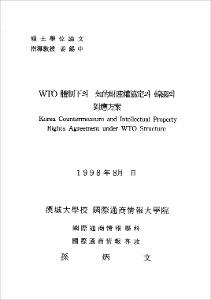WTO 體制下의 知的財産權協定과 韓國의 對應方案
= Korea countermeasure and intellectual property right agreement under WTO structure
- Files in This Item:
-
-
Download
 000000065908.pdf
기타 데이터 / 4 MB / Adobe PDF
000000065908.pdf
기타 데이터 / 4 MB / Adobe PDF
-
Items in Repository are protected by copyright, with all rights reserved, unless otherwise indicated.